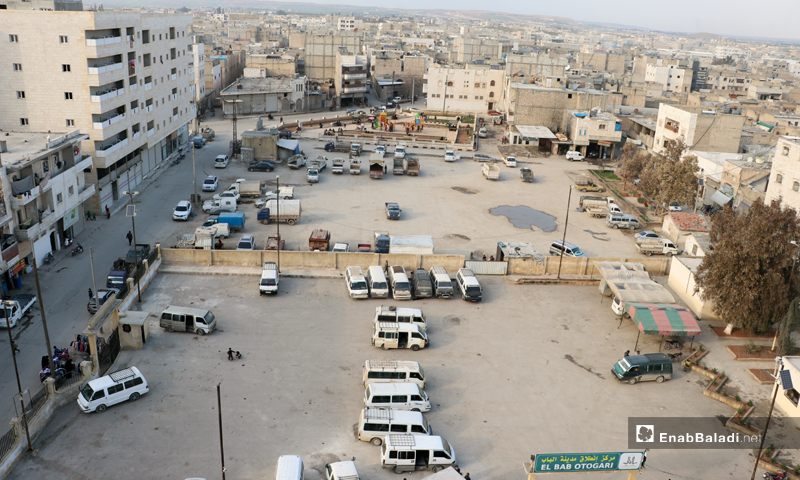The rebel-held city of al-Bab in the northern countryside of Aleppo suffers from extensive damage to its water and power infrastructure, amid lack of maintenance in the networks of water, electricity, and roads. The situation is getting worse with the increasing number of internally displaced persons (IDPs) in the city, following the military operation in the Idlib countryside.
The Director of the relief office in the al-Bab local council, Ihab al-Rajeh, estimated that 5,400 families have been displaced lately to the al-Bab city and its outskirts, in addition to “thousands of IDPs” from various Syrian regions such as Homs, al-Ghouta, and the eastern areas of Syria.
The large numbers of the uprooted populations have led to severe overcrowding in the city’s war-torn roads due to the military offensive. In 2017, the armed opposition factions, with the Turkish support, managed to expel the so-called Islamic State (ISIS) from the city in a military operation titled “Operation Euphrates Shield.”
Overcrowding and limited social services
Ahmad al-Haj Ali, a displaced person from the city of Saraqib, east of Idlib, arrived in the city of al-Bab. There, he was able to get Identity cards for him and his family members from the local council in order to facilitate their legal affairs and his children’s enrollment in public schools.
Even though al-Haj Ali received excellent hospitality from the residents of al-Bab, he confirmed his desire to leave al-Bab at the earliest opportunity, as the city is experiencing extreme crowding and lack of job opportunities.
As for Khaled Shehadeh, a displaced person from the city of Maarat al-Numan in rural Idlib, he said to Enab Baladi that he expected that the city of al-Bab would be in a better situation, as it is administratively affiliated with the Turkish government.
In addition to the crowding, the poor public services stand out as the most prominent problem in the city of al-Bab, as confirmed by Khaled al-Halabi, a resident of the city.
Al-Halabi highlighted that most of the buildings in al-Bab are semi-destroyed, and the water and electricity networks are suspended because of the bombing, in addition to the narrow, worn roads that are full of holes.
Khaled also pointed out that the city’s entire sidewalks are occupied by stores, considering that the responsibility of the city’s local council, “which only made promises, amid slow progress in achieving social sector reforms.”
What is the role of the local council?
The head of the al-Bab local council, Mustafa Othman, told Enab Baladi that work is currently underway to maintain and rehabilitate the infrastructure sequentially, from sewage lines, water, communications, electricity, and road paving, adding that the water project is near completion, and the experimental pumping of water will start soon.
Enab Baladi interviewed with the official of the electric company in al-Bab, Muhammad Assaf previously. Assaf said that the company is working on establishing high-voltage transmission lines from the Turkish border and maintaining transmitters.
Assaf confirmed earlier that the operating period was expected to be at the beginning of December 2019, which has not happened until the moment of writing the report.
Muhammad al-Ali, a resident of al-Bab, does not deny the decisive role the local council is playing, although he described the city as “inactive.”
Al-Ali emphasized the high cost of living due to the destruction of the infrastructure. Still, he sees in return that “efforts are being made to improve the condition of the services in the city every day despite its weakness.”
Al-Ali clarified that he is not defending the local council, but the general circumstance makes the city’s overcrowding very natural. He dubbed the city of al-Bab the “little Syria,” for bringing residents from different provinces altogether.”

